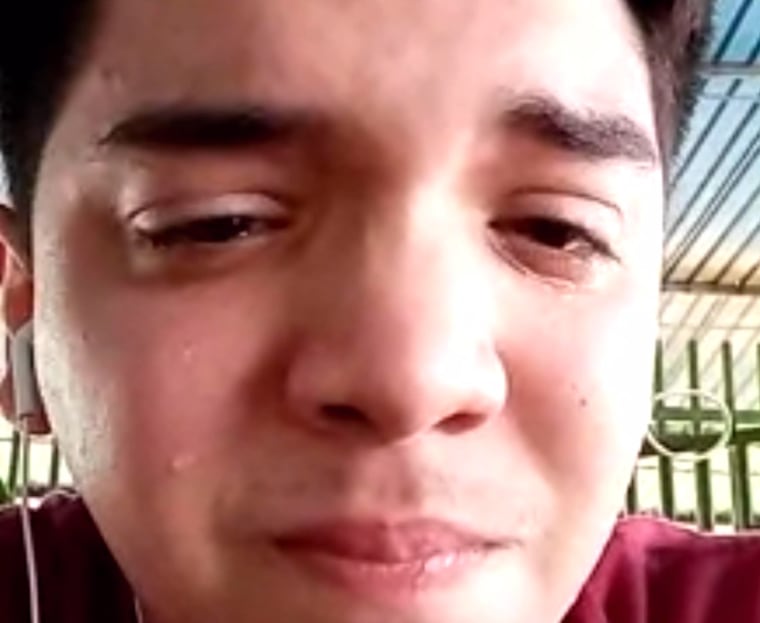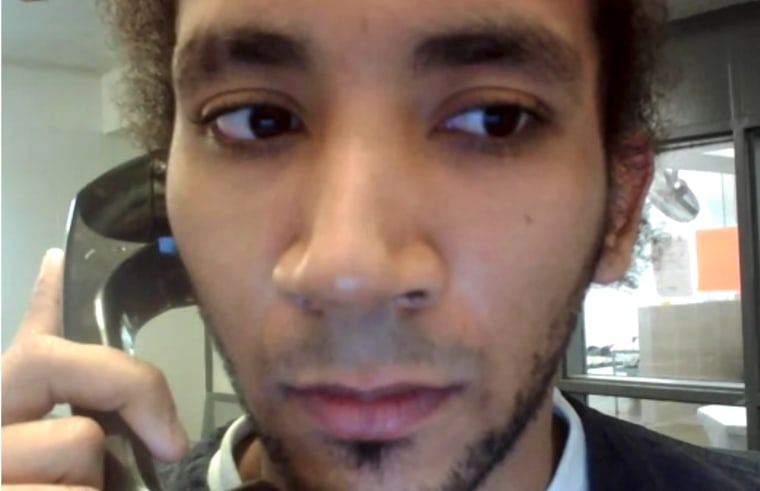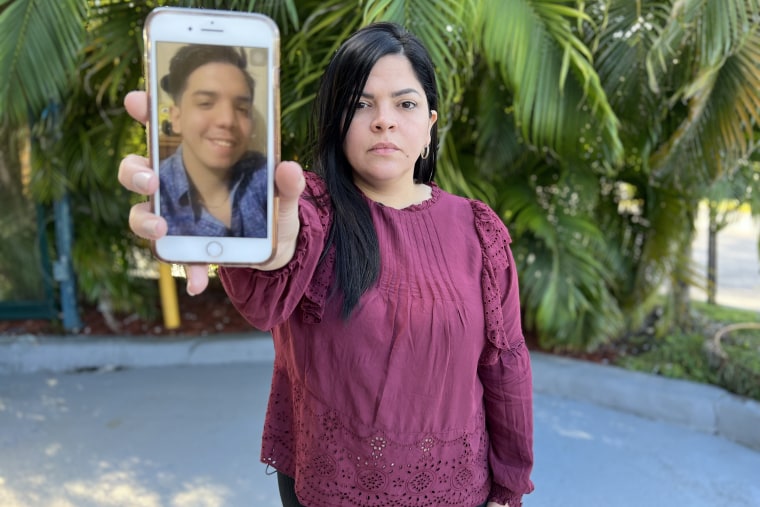MIAMI — Unbeknownst to passengers boarding a commercial flight in December to the Dominican Republic, Ricardo Villasmil, 22, was being deported.
He sat on a plane wearing a winter hat and his mask, showing only his brown eyes, accompanied by a U.S. Immigration and Customs Enforcement agent in casual clothes. He used his phone to discreetly record a nine-second video to warn his mother that he was being expelled from the United States, through Santo Domingo, the capital of the Dominican Republic.
He had sought refuge in the U.S. from the Maduro regime in Venezuela, where his father was assassinated in 2008.
Instead, even though the U.S. does not recognize the government of Venezuelan President Nicolás Maduro, the Biden administration was able to return him to Venezuela by using a third country, the Dominican Republic.
President Joe Biden's administration has been deporting Venezuelans by way of a third country despite condemning former President Donald Trump for doing the same.
In the midst of the tight 2020 presidential race, Biden blasted Trump for using what Biden said were "stealth deportations" through third countries to send Venezuelans "back to the oppressive Maduro regime."
Trump had used Trinidad and Tobago, also in the Caribbean, to deport Venezuelans, a practice revealed by Noticias Telemundo Investiga in March 2020. In that fiscal year, ICE deported 193 Venezuelans through third countries.
From Oct. 1, 2020, to Sept. 31, 2021 — eight months of which fell under the Biden administration — ICE deported 176 Venezuelans, agency data obtained by Noticias Telemundo Investiga showed.
In fiscal year 2021, there were more than 50,000 arrests of Venezuelans at the border, 10 times more than in the previous year.
Interviews with several deportees and their families illustrated that the administration continues to carry out third-country deportations of Venezuelans.
The U.S. Department of Homeland Security did not respond to requests for comment. A spokesperson for ICE, part of DHS, said that in this case, “ICE provides expulsion notifications to the Dominican Republic as a transit country.”
The process often is used when there are no direct air connections with the deportees’ countries — in this case, Venezuela.
ICE told Noticias Telemundo that it does not have contracts with commercial airlines.
The use of third countries by Trump also drew criticism from Sen. Bob Menendez, a New Jersey Democrat who chairs the Senate Foreign Relations Committee. He warned in a statement then that deportations through third countries were "a possible violation of U.S. laws and policies."
Sen. Menéndez said in a statement on Tuesday that the recent reports of the administration removing Venezuelans through third countries “is extremely disturbing” and can lead to "harsh consequences" for Venezuelans who are sent back.
Menéndez urged the administration to end the expedited pandemic-related expulsions of asylum seekers and restore the regular processing of asylum claims.
Dominican authorities did not respond to a request for comment from Noticias Telemundo Investiga.
Last year, the Biden administration announced it was allowing thousands of Venezuelans in the U.S. the chance to apply for Temporary Protected Status, or TPS, which provides protection against deportation. To be eligible, applicants must show continuous residence in the U.S. as of March 8, 2021.
A sentence to torture or death, or both
Some of people being deported are Venezuelans who arrived in the U.S. several months ago and asked for protection at the U.S. border from the Maduro government.
In its latest human rights report, the U.S. government defined Venezuela as “an illegitimate and authoritarian regime” whose leaders and security forces commit “crimes against humanity.”
After half a year in ICE detention in Louisiana, Villasmil was transferred to Newark Liberty International Airport, in Newark, New Jersey, where he tried to fight his deportation.
“I refused to get out of the truck. I said that going to my country was the end for me,” Villasmil said in a video call from Venezuela. “They just weren’t interested. All they did was threaten me that they would keep me in solitary confinement longer if I refused to get on the plane.”
Villasmil said his handcuffs were removed before entering the terminal, and he was warned not to create any kind of ruckus in the airport. Other deportees told Noticias Telemundo they got the same instructions.
His family has said that due to political reasons they’ve faced years of arrests, changes of address, kidnappings and a death threat that triggered their departure from the country. Seven members of the family arrived at the U.S. border to request asylum in June.
U.S. authorities "know that the sentence for these Venezuelans is going to be torture or death, or both," immigration attorney Elio Vázquez said.
"It is the agreement that they [the U.S. authorities] have with Santo Domingo to deport Venezuelans to their native country after losing the credible fear [interview] with the immigration officer and losing the review with a judge," Vázquez said. "They put them in deportation proceedings."
The credible fear interview is the first formal opportunity migrants have to express, before U.S. officials, why they would be persecuted in their country if returned. But if the claims aren't deemed credible by the immigration officer and the immigration judge, the migrant loses the opportunity to seek U.S. asylum and faces a deportation order.
In Villasmil's case, his credible fear claim was rejected, while the rest of his family managed to advance in their asylum processes.
Vanishing hopes as Caracas nears
On the deportation flight, Villasmil sat in a middle seat, with the two undercover ICE agents sitting in the nearest aisle. When he went to the bathroom, he said, they accompanied him and waited for him at the door, as if they were standing in line.

Villasmil described the treatment by the ICE agents as cordial. One loaned him a charger, so his cellphone battery wouldn't run out, and in turn Villasmil acted as a translator when they arrived in the Dominican Republic, since the ICE officers did not speak Spanish.
In Santo Domingo, Villasmil continued to use his cellphone to message with his mother in the U.S.
His spirits hit rock bottom, he said, and his hope of avoiding returning to Venezuela had vanished. "I did everything I could, really," he said.
According to Villasmil, Dominican officials put him on the plane to Venezuela. ICE agents were no longer with him, and the young Venezuelan still did not have his passport. They gave it to him along with his documents while he was sitting inside the plane. Caracas, Venezuela's capital, was already an inevitable destination.
“It is illogical knowing the situation that we Venezuelans are experiencing,” Villasmil said.
Some deportees told Noticias Telemundo Investiga they were interrogated, detained for days, mistreated or summoned to court upon arrival at the Maiquetía airport, which serves Caracas. They spoke on condition of anonymity out of fear of reprisal in Venezuela.
Noticias Telemundo Investiga contacted representatives of the Maduro government in Venezuela but did not receive a response from the Foreign Ministry.
There are some 4,500 Venezuelans in U.S. immigration detention centers, according to Venezuela’s consular authorities. The United States recognizes Maduro’s opponents, led by Juan Guaidó, as legitimate representatives of Venezuela, and they deal with diplomatic affairs in Washington.
Brian Fincheltub, director of consular affairs at the Venezuelan Embassy in Washington, said "we have done everything in our power" to prevent deportations to Venezuela due to immigration issues.
He said the deportations were isolated cases in the context of numerous arrivals of Venezuelans at the border.
'I’m going to throw myself on the floor'
Some Venezuelans with deportation orders have taken more drastic action to stop their expulsions: refusing to board the plane bound for the Dominican Republic.
“I told them that if they were going to force me to get on the plane, I was going to throw myself on the floor and seek help from people,” Carlos Rincón, a 25-year-old Venezuelan, said by phone from an ICE detention center in Louisiana, where he was returned in mid-December.

Katherin Martínez, 29, said she feared for her physical well-being when she was returned to Venezuela through the Dominican Republic. Desperate, she looked for a way to return to the U.S. border. After all, she thought, all the relatives with whom she emigrated the first time managed to start an asylum process.
After traveling through several countries, her hopes were shattered when she again stepped on American soil.
"They transferred me to this center, which, to my bad luck, is the same one I was in three months ago, and I’m terrified," Martínez said, speaking from an immigration detention center in Louisiana.
She said she is scared that after a Covid-19 test she will be transferred to New Jersey — and onto several planes on the way to Caracas, Venezuela.
A version of this story was first published in Noticias Telemundo.
Follow NBC Latino on Facebook, Twitter and Instagram.
